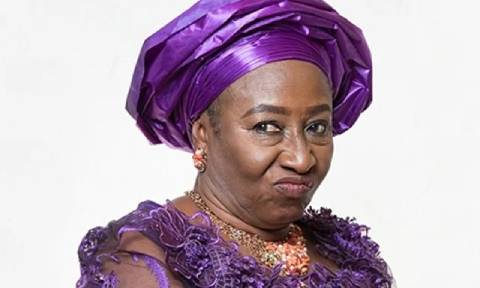
Folake Shadare is by no means a newcomer to the Nigerian film industry. A graduate of the Lagos State University where she studied History and International Relations, she started acting in 2005 and stayed on the screen for two years before delving into business.
How did her romance with the screen begin? Unlike most other movie artistes who must have dreamed of it a lot before taking a final plunge, Folake Shadare practically stumbled into acting. “I went to see a friend in a boutique and she started talking about home video films. I told her that I would like to act in the movies. The next time she was given a role in a movie, she asked me to accompany her to the location and I did. That was how I was exposed to acting. I was eventually given a part to play in KKK. That was my first film and it was produced in 2005,” she said.
In KKK, Shadare found herself playing a role that was quite unusual for a woman. She acted the part of an armed robber and it seemed that her producers would never stop casting her for violent and bad-girl roles in subsequent films. Standing at about five feet, eleven inches and looking well-built, she attributed this to her physique. “But I liked it. I liked the roles that I played in my earliest movies,” she confessed.
She considered Omoge Campus, a home video set in a contemporary Nigerian university campus, which focused on the menace posed by secret cults to life on campuses and the decline of moral values in most educational institutions in the country, as the most challenging among the films she had participated in. And it was because she acted in five gruelling scenes in the movie. “I played the part of a female cultist who was always fighting rival cultists on campus. It was a very challenging role and shooting was hectic while it lasted,” she said.
The period between 2005 and 2009 might seem so short for an artiste whose career began on a simple note to gain all the experience that she needed, but Shadare claimed that she had acted in over 100 home videos in Nigeria and starred in no fewer than four movies abroad. She would most likely remember films like Omoge Campus, City Girls, Imported Lomo and Oko Akata, among several other exciting ones, for the rest of her life. All the films were produced in Yoruba language.
A five-cast home video film titled Oluwajomiloju, that is still in progress, is the latest in Shadare’s repertoire. Incidentally, it is the first film she has produced. “We are still editing the film. It will be subtitled in English, French, and in the indigenous languages of South Africa, Ghana, and a few other countries in Africa,” she declared with a note of pride in her voice. She added that the film would be released around Easter and premiered in two locations: Nigeria and London.
Literally translated from Yoruba to English, the word Oluwajomiloju means God has sprung a wonderful surprise on me. According to Shadare, it is the story of a poor young woman who, faced with the harsh realities of life, decides to take to the streets and depend on her wits in order to survive.
The film is an indictment of the get-rich-quick attitude of many Nigerians. Shadare used the medium to send a message across to viewers all over the country and in the Diaspora. “My message is particularly meant for the women folk. You know, women love money a lot and they allow it to control them most of the time. I am trying to tell Nigerian women not to let money control them. Instead, they should be in control of money,” she said.
Regarding the origin of the film’s title, Shadare said it was borne out of an urgent desire to express gratitude for what God had done in her life. She said, “I was only trying to interpret what happened to me when I was living abroad. I have a baby whose name is Oluwajomiloju. I gave him that name because God was good to me. For instance, my baby’s passport was issued to him just one month after I gave birth to him. Ordinarily, he would not have been given the passport until he attained the age of ten. I felt so grateful to God for this miracle that I decided to produce a movie and dedicate it to him”.
Perhaps to ensure that the film enjoyed wide acceptance from audiences across Nigeria and abroad, Shadare decided to carve out roles for a popular fuji music star, Pasuma Wonder, and the current rave of the Nigerian hip hop scene, 9ice. And since she made the decision to feature both artistes in Oluwajomiloju, she has had no regrets. “I had this feeling that having both Pasuma and 9ice on the set of the film would be worthwhile. I wanted their presence in the film to boost the image. I had listened to 9ice’songs carefully and arrived at the conclusion that he spoke Yoruba very fluently. In fact, he played the role I gave him very well. Pasuma and I have known each other for a long time. We have been involved in the entertainment industry for a while. He was the one who helped me to get in touch with 9ice and others. He was willing to feature in the film as long as I paid him a certain amount of money, and I did,” she said.
Shadare played the lead role in Oluwajomiloju. The film is produced by Destiny Movies International, which she founded. But just as she discovered that 9ice was cut out for the screen, she might possibly unveil other potential movie stars lurking in the shadows. For this purpose, she established an institution known as Destiny Movie Academy, ostensibly to train and promote aspiring movie artistes.
Surprisingly not married, despite the fact that she had given birth to three children for a lover whom she said lived abroad, Shadare said she had no problem dividing her time between her children and the studio. “I choose the roles that I play in the movies so that I would have enough time to take care of my children,” she said.
A single mother whose interests seem quite divergent, Shadare did shuttle around the globe a number of times in the past, buying and selling merchandise. She said it was “just to put body and soul together”.
By Chux Ohai



















